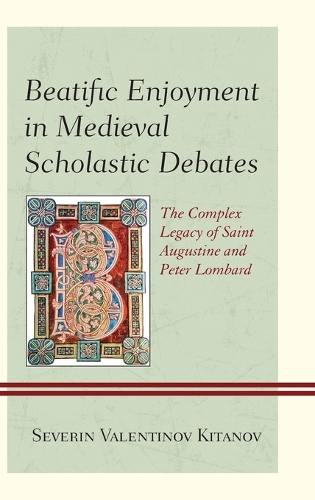
Beatific Enjoyment in Medieval Scholastic Debates: The Complex Legacy of Saint Augustine and Peter Lombard
(Hardback)
Available Formats
Publishing Details
Beatific Enjoyment in Medieval Scholastic Debates: The Complex Legacy of Saint Augustine and Peter Lombard
By (Author) Severin Valentinov Kitanov
Bloomsbury Publishing PLC
Lexington Books
25th March 2014
United States
Classifications
Professional and Scholarly
Non Fiction
Medieval Western philosophy
History
Philosophy: metaphysics and ontology
234.9
Physical Properties
Hardback
360
Width 161mm, Height 236mm, Spine 26mm
576g
Description
Beatific Enjoyment in Medieval Scholastic Debates examines the religious concept of enjoyment as discussed by scholastic theologians in the Latin Middle Ages. Severin Kitanov argues that central to the concept of beatific enjoyment (fruitio beatifica) is the distinction between the terms enjoyment and use (frui et uti) found in Saint Augustines treatise On Christian Learning. Peter Lombard, a twelfth-century Italian theologian, chose the enjoyment of God to serve as an opening topic of his Sentences and thereby set in motion an enduring scholastic discourse. Kitanov examines the nature of volition and the relationship between volition and cognition. He also explores theological debates on the definition of enjoyment: whether there are different kinds and degrees of enjoyment, whether natural reason unassisted by divine revelation can demonstrate that beatific enjoyment is possible, whether beatific enjoyment is the same as pleasure, whether it has an intrinsic cognitive character, and whether the enjoyment of God in heaven is a free or un-free act.
Even though the concept of beatific enjoyment is essentially religious and theological, medieval scholastic authors discussed this concept by means of Aristotles logical and scientific apparatus and through the lens of metaphysics, physics, psychology, and virtue ethics. Bringing together Christian theological and Aristotelian scientific and philosophical approaches to enjoyment, Kitanov exposes the intricacy of the discourse and makes it intelligible for both students and scholars.
Reviews
Kitanovs book is a detailed, well-composed treatment; indeed, one could liken it to an encyclopedia. He presents many positions and discusses them thoroughly according to the sources. . . .He also gives summaries after almost each section, which makes it easy for the reader to grasp the essence of the sections. . . .Kitanovs book is a good compilation of the different interpretations of Augustines (and Lombards) view of mans final happiness in its Christian form. Any scholar interested in the history of beatific enjoyment in the Latin West during the Middle Ages would be well advised to consult Kitanovs book. * Review of Metaphysics *
The author's astute philosophical and logical treatment of its subject prevents a straight-through reading of Beatific Enjoyment from becoming a paralyzing ordeal, rendering instead merely a difficult and careful journey that is well worthwhile. . . .The author's treatment of his subject is an unusual achievement of both historical research and discerning insight into a subject that requires both. Beatific Enjoyment in Medieval Scholastic Debates is highly recommended by this reviewer to anyone willing to persevere in Kitanov's labyrinthine treatment of this very specialized intellectual journey. * The Sixteenth Century Journal *
Beatific Enjoyment in Medieval Scholastic Debates provides a thorough and reliable analysis of the discussion of medieval beatific enjoyment, enriching our awareness of the epistemic, moral, and psychological resources of this fascinating subject. -- Risto Saarinen, University of Helsinki
Severin Kitanovs thorough analysis reveals the tremendous complexity and diversity of medieval views not just on beatitude but also on freedom, the passions, and cognition. Beatific Enjoyment in Medieval Scholastic Debates is invaluable for philosophers and medievalists alike, on topics from natural theology to moral psychology and beyond. -- Eileen Sweeney, Boston College
The book not only brings together the scholarship on the topic to date but maps out whole new areas for research and investigation. -- Michael Dunne, National University of Ireland, Maynooth
Author Bio
Severin Kitanov is assistant professor of philosophy at Salem State University.
